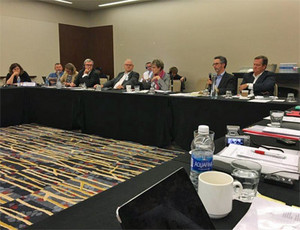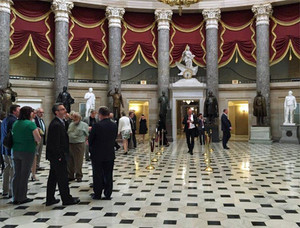https://www.dialog-igmetall.de/nachrichten/meeting-under-the-international-framework-agreement-for-the-us
19.04.2024, 01:04 Uhr
Meeting under the International Framework Agreement for the US
- 13.07.2016
- International
A basis for further dialogue between unions and management has been established: On June 13th/14th, the meeting under the International Framework Agreement (IFA) of Siemens for the US took place at Washington D.C..
The participants were:
The Negotiation Committee of the Central Works Council of Siemens Germany:
Birgit Steinborn, Chair of the Central Works Council, Deputy Chair of the Supervisory Board of Siemens
Robert Kensbock, Deputy Chairman of the Central Works Council, member of the Siemens Supervisory Board
Bettina Haller, Chair of the Siemens Group Works Council, member of the Siemens Supervisory Board
Harald Kern, Chairman of the Siemens Europe Committee (SEC), member of the Siemens Supervisory Board
Dietmar Kuttner, Spokesman of the South-West Germany region of the Central Works Council
Mimon Uhamou, Spokesman of the Western Germany region of the Central Works Council
From the office of the Central Works Council:
Ev Zirkler
From IG Metall:
Reinhard Hahn, union officer responsible for Siemens
Dirk Linder, responsible for international union contacts at Siemens
Steering Committee of the five US unions IBEW, IUE-CWA, USW, IAM and UAW:
Randy Middleton, IBEW
Jim Clark, President of IUE-CWA
John Shinn, USW
Tom O´Heron, IAM
Mark Haasis, UAW
Union representatives from Siemens locations:
John Baglione, USW, Olean, New York
Phyllis Goines, IBEW, Grand Prairie, Texas
Jim Lewis, IAM, Wellsville, New York
Terry Schoonover, IUE-CWA, Painted Post (Erwin), New York
Wayne Cupp, IUE-CWA, Norwood, Ohio
Robert Sutton, UAW, Richland, Mississippi
Chris Bell, IBEW, Houston, Texas
Andy Campbell, IAM, Mount Vernon, Ohio
Denny Ruemler, USW, Mishawaka, Indiana
Pete Gribbin, USW, Trenton, New Jersey
Bryan Michaud, IBEW, Boston, Massachusetts
Paul Greco, IBEW, New York, New York
Lew Morgenstern, IBEW, New York, New York
Thomas Solis, IBEW, Pomona, California
Tom Gantz, IBEW, Wendell, North Carolina
Nicholas Read, IBEW, Beaverton, Oregon
Carlos Martinez, IBEW, Kansas City, Missouri
Anthony Juarez, IBEW, La Mirada, California
Other union officials:
Lela Klein, IUE-CWA
Ben Davis, USW
Jerry Kurimski, IBEW
William Hofring, IBEW
Owen Herrnstadt, IAM
Guests:
Wilma Liebman, University of Illinois, former head of NLRB
Brad Markell, AFL-CIO
Hermann Nehls, Counsellor at the German embassy in the US
Carsten Hübner, Director of the „Transatlantic Labour Institute“
The meeting consisted of two parts, an internal meeting of the union representatives from the US and Germany and a meeting with management representatives.
The German union representatives gave information about the German system of employee representation, especially about the Works Council system and the cooperation of unions and Works Councils in Germany. It was made clear, that even in Germany the employer makes the decisions about the business of the company and the jobs, but there are various possibilities for the union and the representatives of the employees to take influence.
The representatives of the US unions emphasized the importance of the meeting as the result of the cooperation of five important US unions at Siemens. They have agreed on the formation of a steering committee after the workshop that took place in February in the US. They now aim at the recognition of this steering committee as representation of the unions at Siemens in the US by the management.
The German union representatives pointed out, that similar achievements, such as the creation of a union network on national level in spite of a lack of legal support in national law, have been reached at Siemens for example in China or India.
Several issues concerning certain locations were addressed, such as the closure of the former Rolls-Royce plant in Mount Vernon, Ohio, the up to now insufficient integration of Dresser-Rand at Siemens or the partly bad relationship and communication with the local management.
Wilma Liebman held a lecture about the issue of “Neutrality Agreements”. She made clear, that US labour law leaves a lot of space for cooperative relations between companies and unions. The practical problem is the misuse of legal possibilities in a disruptive way by employers respectively anti-union groups of employees.
IG Metall, the Central Works Council of Siemens Germany and the US unions have agreed with the Siemens management to reach a supplemental agreement for the US that guarantees the implementation of the International Framework Agreement of Siemens in the US. The draft of this supplemental agreement was discussed at the meeting. It turned out to be clear, that there were several reasons for the US unions why the agreement could not yet be accepted.
On the second day of the meeting Mr. Erb (Head of HR Siemens), Mrs. Günther (HR Siemens), Mr. Spiegel (CEO Siemens USA), Mr. Stegemann (CFO Siemens USA), Mr. Panigel (Head of HR Siemens Americas), Mr. Vickers (HR Siemens USA), Mrs. Brie Sachse (Communikation Siemens USA), Mrs. Reicherts (Government Affairs Siemens USA) and Mr. Etzwiler (Siemens Foundation) took part as representatives of the management.
Mr. Panigel gave information about the Siemens activities in the US. Siemens has about 50 000 employees in the US in more than 400 locations. 10 unions are represented at Siemens (IBEW, IUE-CWA, USW, IAM, UAW, BRS, IUOE, UA, UBC and FISU).
Siemens maintains apprenticeship programs at several facilities. These apprenticeship programs follow the German model, which means that the apprentices are Siemens employees with a remuneration and are trained practically at Siemens and in theory at a public vocational training school.
Mr. Spiegel and Mr. Stegemann informed about the business figures of Siemens in the US. Siemens has grown very much in the US mainly by acquisitions, so that now Siemens is among the top 15 companies in the US. Mrs. Brie Sachse, Mr. Etzwiler and Mrs. Reicherts gave information about the work of their departments.
A main issue of the discussion was the possible cooperation of management and unions. The unions offered their support of the company in several issues, such as discussions with politicians or vocational training.
The representatives of the management promised to take care of the local problems that were addressed at the meeting
There was also a discussion between two policy advisors from the Democratic respectively the Republican Party about the US politics. It was made clear that the political situation in the US is difficult. Both supposed presidential candidates are not supported by large parts of the voters.
The final and main discussion was about the draft of the supplemental agreement for the US. The union representatives pointed out the reasons, why they could not agree to the draft of the agreement. They also emphasized that they still see good chances to reach an agreement by further negotiations between management and the steering committee of the five unions that has been formed in February.
Mr. Panigel agreed to continue these negotiations. After this discussion, the meeting was closed with another internal meeting of the union representatives from the US and Germany. The participants agreed that the meeting fulfilled everybody’s expectations and that there are good chances to establish a social dialogue between unions and management in the US.
(Dirk Linder)



